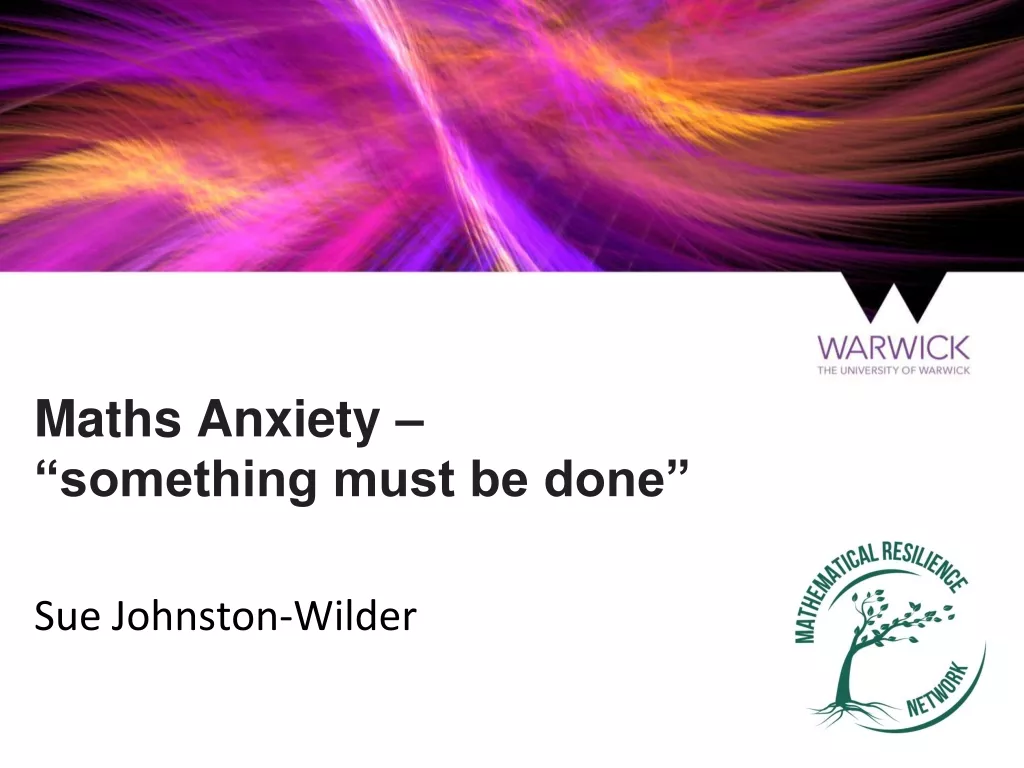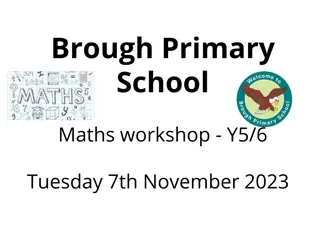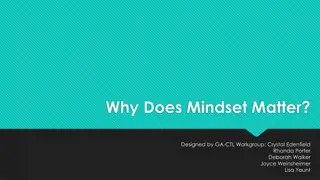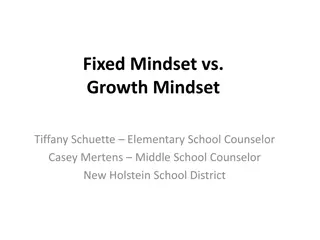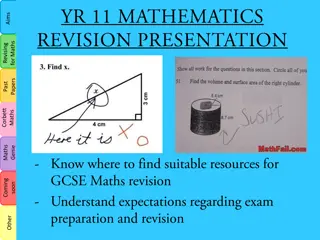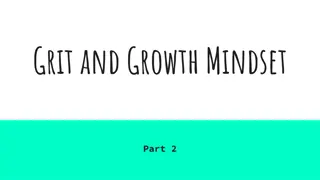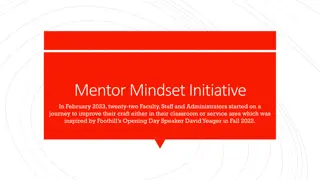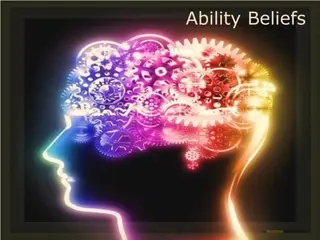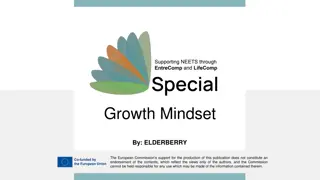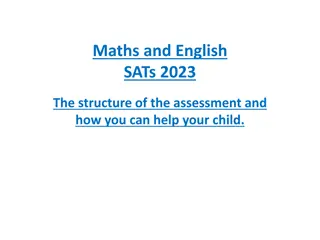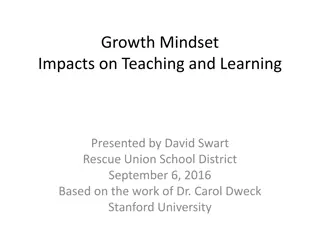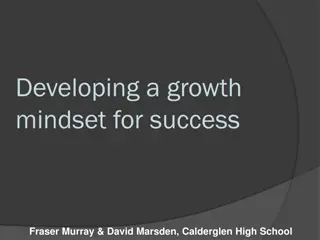Your Mathematical Mindset and Beliefs Towards Maths
Uncover your mindset towards math by taking a survey that challenges fixed and growth mindsets. Reflect on beliefs about math ability, problem-solving approaches, and the impact of effort on learning. Discover where you stand in the spectrum from fixed to growth mindset and how it influences your mathematical journey.
Download Presentation

Please find below an Image/Link to download the presentation.
The content on the website is provided AS IS for your information and personal use only. It may not be sold, licensed, or shared on other websites without obtaining consent from the author.If you encounter any issues during the download, it is possible that the publisher has removed the file from their server.
You are allowed to download the files provided on this website for personal or commercial use, subject to the condition that they are used lawfully. All files are the property of their respective owners.
The content on the website is provided AS IS for your information and personal use only. It may not be sold, licensed, or shared on other websites without obtaining consent from the author.
E N D
Presentation Transcript
Aims To explore your own mindset To determine the difference between fixed and growth mindsets. To experience Low floor, high ceiling problems To explore how to you can help develop a growth mindset.
How about you? Complete the survey. Be honest about your own beliefs towards maths
Do you Agree or Disagree? 1. Trying a problem I don t know how to solve is the best way to solve new maths. Disagree a lot Disagree Disagree a little Agree a little Agree Agree a lot Profile Number 1 2 3 4 5 6 2. You have a certain amount of maths ability and you can t do much to change it. 3. I like maths best when it makes me think hard. 1 2 3 4 5 6 1 2 3 4 5 6 4. How intelligent you are mostly determines how well you do in maths. 5. Drawing pictures or making tables helps me to do maths. 1 2 3 4 5 6 1 2 3 4 5 6
Do you Agree or Disagree? 6. How well you can memorise determines how well you do in maths. 7. When a new maths concept is hard, it just wants me to work more on it to figure it out. 8. Maths ability is mostly genetic; you either have it or not. Disagree a lot Disagree Disagree a little Agree a little Agree Agree a lot Profile Number 1 2 3 4 5 6 1 2 3 4 5 6 1 2 3 4 5 6 9. You can greatly change your ability to do maths. 1 2 3 4 5 6 10. How fast you can get to an answer is a good measure of your maths ability. 1 2 3 4 5 6
10-20 You strongly believe that your maths ability is fixed it does not change much. If you can t learn something quickly and easily, you would rather not do it. You think smart people don t have to work hard and that some people are naturally good at maths.
21-30 You lean toward thinking that your maths ability does not change much. You prefer not to make mistakes if you can help it and you also don t really like to put in a lot of work. You may think that learning should be easy, it makes you feel uncomfortable when other people answer questions quickly.
31-40 You have not really decided for sure whether you can change your ability to learn maths. You care about how well you do and you want to learn, but you don t really want to work too hard for it. Sometimes it may seem that other people have it easy when it comes to learning new maths concepts.
41-50 You believe that your intelligence and maths ability is something that you can increase. You care about learning and you are willing to work hard to learn new, complex ideas. You want to do well, but you think it is more important to learn than to always score well.
51-60 You really feel sure that you can increase your ability to do maths by learning and you like a challenge. You believe that the best way to learn is to work hard and you don t mind making mistakes while you do it. You might try all different kinds of strategies to solve difficult problems and you don t give up easily.
What is a growth mindset? Day 1 Mindsets Growth Mindset Class Dojo Pupils describing mindsets You Cubed Tortoise and Hare
Key Messages Everyone can learn maths Believe in yourself Mistakes are important Speed is not important
How can you have a growth Mindset? Step 1 : Put in Lots of effort Step 2 : Choose challenging tasks. Step 3 : Find the strategies that work and don t work. Step 4 : Face setbacks.
The power of Yet. YET! I can t do this .. I am not capable of solving this problem .. YET!
Activity How many cubes are in the 10th case? How many cubes are in the 100th case?
Growth Mindset Fixed Mindset
It took me 17 years and 114 days to become an overnight success -Lionel Messi
People tell me that I m born with natural talent I m like . . . uh no! . . . I just practice. - Ed Sheeran
Ive missed more than 9000 shots in my career. I ve lost almost 300 games. 26 times I ve been trusted to take the game winning shot and missed. I ve failed over and over and over again in my life. And that is why I succeed - Michael Jordan
If you hear.. I am just not a maths person. You obviously don t have a maths brain. You are better suited to I am never going to get this I can t do maths
Change your Words Change your Mindset. I am not good at this How could I get better at this?
Change your Words Change your Mindset. This is too hard This may take some time and effort but I can do this.
Change your Words Change your Mindset. I give up I ll try some strategies I have learned.
Change your Words Change your Mindset. It s good enough. Is this really my best effort?
Change your Words Change your Mindset. I ll never be as smart as them. I will figure out how they do it and try it myself.
Change your Words Change your Mindset. I made a mistake. Mistakes help me improve.
Perfect example of growth mindsets ..\langridge-and-ellis-gm_dvd.mp4 ..\langridge-and-ellis-gm_dvd.mp4
2017 Use the digits 2, 0, 1 and 7 to make as many of the numbers between 1 to 30 You can use as many + , - , x, signs as you want. For each answer you must use all of the digits 2, 0, 1, 7. 1. 11. 21. 2. 12. 22 3. 13. 23. 4. 14. 24. 5. 15. 25. 6. 16. 26. 27 -10 7. 17. 27. 8. 18. 28. 9. 19. 29. 1 + 7 + 2 + 0 10. 20. 30.

 undefined
undefined



